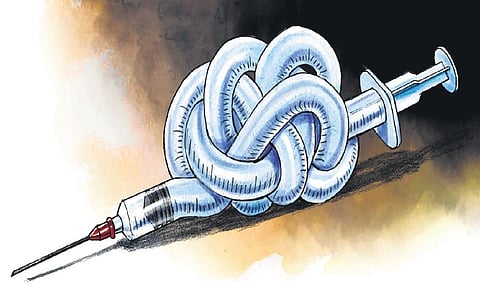

THIRUVANANTHAPURAM: Administration of the second dose of Covid vaccine, that will increase the immunity by 81 per cent, in the state has almost stopped at a time when studies show that a single dose would not give the required protection against the mutant variants. The number of people who are due for a second dose after the stipulated time between doses have increased, and they are worried of becoming vulnerable to the infection.
At present, less than half of the target group above 45 years has received the first dose while only less than one fourth of them received the second dose. The 22 per cent coverage has not changed in the last three weeks.
“The government said the second dose will be made available without creating the opportunity for crowding at the vaccination centres. The spot registration was stopped and we were told that the ASHA workers would help with the second dose at the nearby centre. The due date for the second dose is fast approaching and the local officials are clueless on giving me a slot,” said 70-year-old Thomas Mathew in Pandalam. He said the second dose should be given as early as possible because more people around his house were getting infected creating anxiety among family members.
Recent studies say highly vulnerable groups should be given both the doses within a gap of six to eight weeks. The Public Health England study found that a single dose of Oxford-AstraZeneca vaccine (Covishield) offered only 33.5 per cent protection against the Indian or double mutant virus variant (B.1.617). While the United Kingdom reduced the time gap between doses from 12 to 8 weeks, the gap in India has been increased from 12 to 16 weeks.
The findings have a relevance to the state as the fast spreading of Covid infection in the second wave was attributed to the mutant variants. A genomics study by CSIR-Institute of Genomics and Interactive Biology found that Indian variant has replaced the UK variant ( B.1.1.7) as the most dominant virus variant present in the state in April. Earlier it was the UK variant which accounted for 50 per cent of the cases, according to a similar study based on the samples collected in March.
“The vaccine policy should give priority to give a second dose to all those eligible for it. The most vulnerable group should be protected first. The lack of availability of second dose is probably a more significant issue than a person of lesser age getting first dose,” said Dr Vishad Viswanath, a consultant rheumatologist. A health official who is part of the vaccine management said the issue will be sorted with the arrival of more doses in the coming days.
HC DIRECTS GOVT TO VACCINATE JUDICIAL OFFICERS AND COURT STAFF ON PRIORITY
Kochi: The High Court has directed the state government to give Covid vaccination to judicial officers and staff of the HC and subordinate courts on a priority basis. The court issued the order seeking the inclusion of judicial officers and lawyers in the priority category for vaccination.The court also directed the government to ensure that district collectors take up the matter of the inoculation of subordinate courts’ staff with the principal district judge of each district and devise methods to provide inoculation on a priority basis. The registration should be facilitated through the salary disbursal application, SPARK. The court also directed the government to devise a method for inoculation of lawyers and advocate clerks with expedience.